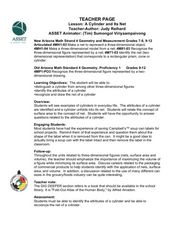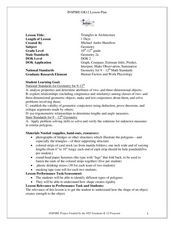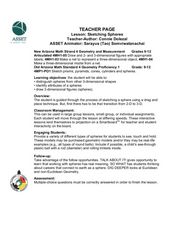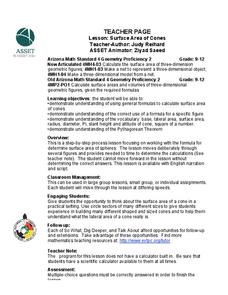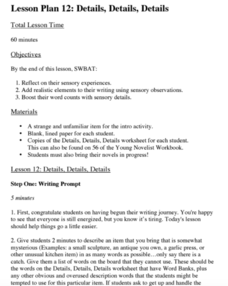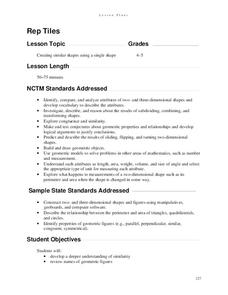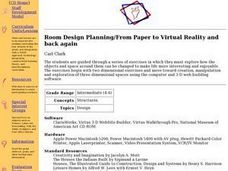Curated OER
A Cylinder and Its Net
Students sketch the nets for given polygons and cylinders. In this geometry instructional activity, students find the measurements that correspond with prisms, cones and cylinders. they identify parts of three-dimensional shapes.
Curated OER
Sketching Pyramids
Students sketch and identify properties of pyramids. In this geometry lesson, students create nets to identify three dimensional shapes. They sketch cones, prisms and pyramids.
Curated OER
Triangles in Architecture
Learners find triangles in the real world. In this geometry lesson, students analyze and identify properties of two and three-dimensional objects. They differentiate between similarity and congruence.
Curated OER
Sketching Spheres
Students investigate spheres through sketches. In this geometry lesson, students sketch two and three dimensional shapes creating nets. They find and differentiate between the nets for prisms, pyramids, cones, cylinders and spheres.
Curated OER
Surface Area of Cones
High schoolers find the surface area of cones. In this geometry lesson plan, students calculate the dimensions of each three-dimensional shape and use the correct formula to solve the problem. They relate concepts of cones to the...
Curated OER
Exploring Arrangements of 2, 3, 4, and 5 Cubes
Students use problem solving skills to create various models of tricubes, tetracubes, and pentacubes. They classify the cubes into various groupings and identify them as mirror images, regular arrangements, and irregular arrangements....
Curated OER
Artifacts: Bringing the Past Back to Life -- the Mexican Case
Young scholars examine and discuss the meanings of the various symbols in Tenochtitlan. In groups, they complete a part of the model of the city and discuss the importance of finding artifacts. Individually, they choose an a...
Curated OER
Surface Area and Volume of a Cube
Students explore finding the surface area and volume of cubes and cylinders. They construct similar three-dimensional figures from a two-dimensional drawing. Students derive the formula for volume and surface area through examination...
Curated OER
Copycats
Third graders describe the features of 2 and 3 dimensional objects and use the language of geometry. They design and make a pattern which involves translation, reflection or rotation.
Curated OER
Perfumania
Students identify various geometric shapes. Apply the given formulas to determine the volume of these shapes. Design their own container to conform to specifications provided. Use their knowledge of volume formulas and shapes to compute...
Curated OER
Details, Details, Details
Writing can become one-dimensional if authors don't involve all their senses. First, scholars observe a strange object which, ideally, they can touch and even smell. Without using certain words (you can create a list or have the class...
Curated OER
Shape Hunt
Young scholars explore two-dimensional and solid shapes. In this shapes and patterns geometry lesson, students work with a partner to create identifiable objects using tangrams. Young scholars describe the attributes of their shape and...
Alabama Learning Exchange
Twisted Tangrams
Primary geometers create a picture using tangrams. In this geometry lesson, students read Grandfather Tang: A Tale Told with Tangrams, cut out their own tangrams, and choose a character from the story to make using their tangram pieces.
Technical Sketching
Introduction — Surfaces and Edges
How different can 3-D and 2-D really be? An engineering resource provides an explanation about the importance of two-dimensional technical drawings. Several samples show how to create multi-view drawings from pictorials and...
Improving Measurement and Geometry in Elementary Schools
Rep Tiles
In addition to the catchy title, this lesson plan provides upper graders an opportunity to more closely scrutinize the attributes of plane figures. In particular, they focus on the similarity of different shapes. Both whole-class and...
Curated OER
A Bird's-eye View
Sixth graders create a chalk drawing of a scene of their choice by using the process and techniques of horizon line, a variety of lines, vanishing points, and three-dimensional techniques.
Curated OER
Design-A-Room
Students employ art as a means of communication. The meaning of the communication comes out in the design of a unique room that is 3 dimensional. The use of the imagination is encouraged as well as visualization skills.
Curated OER
Mass and Space
Learners view a variety of sculptures analyzing how space and mass interact, and how sculptors make choices about mass and space to express meaning in their art. They make small three-dimensional sketches experimenting with mass and space.
Curated OER
Sun, Shadows, Surface Structure...and the Face on Mars
Students use light and shadow information to make inferences regarding the three dimensional shapes of specific objects photographed on the surface of Mars. Limitations of the of the data provided are discussed and entries made into the...
Curated OER
Grade 2: Roll or Slide?
Second graders organize solids into categories, depending upon whether they will roll, slide or do both on a home made ramp. Students describe and compare attributes of three-dimensional geometric solids.
Curated OER
Room Design Planning/From Paper to Virtual Reality and Back Again
Young scholars participate in activities in which they explore how the space and objects around them can be altered. Using various types of software, they design and create a three-dimensional building and share it with the class. They...
Curated OER
Geometry Jeopardy
Students identify the pattern in a problem. In this geometry lesson, students make predictions, collect and analyze data. They apply the idea of scales and measurements to the real world.
Curated OER
The Android Factory
Pupils explore the idea that primitive virtual 3D objects can be reshaped to infinitely original combinations using additive and subtractive methods. They create 3-D objects with a computer which necessitates a cooperation of right-brain...
Curated OER
Hands-on Cells
Students review the components of a cell and the differences between plant and animal cells by creating a three-dimensional model of each type of cell. In small groups, they use modeling clay and household object to construct their models.
